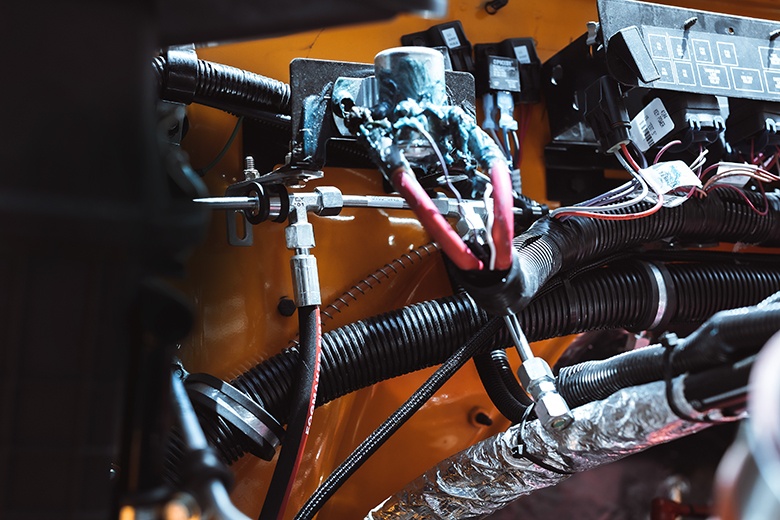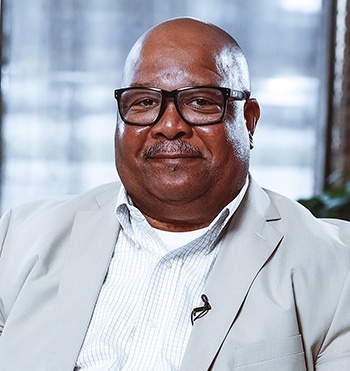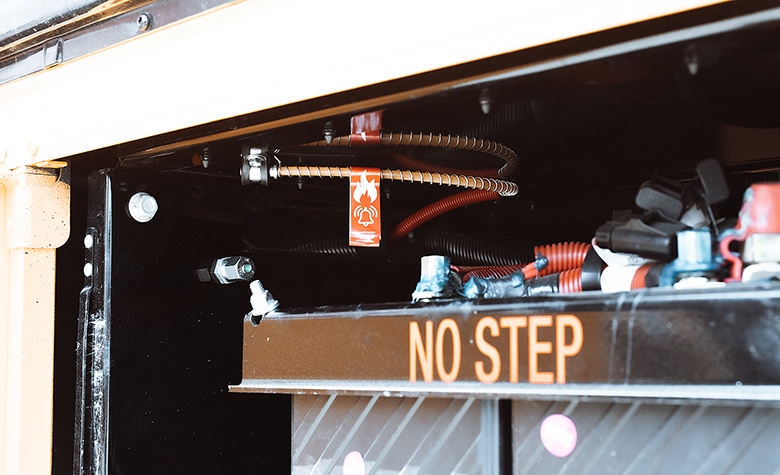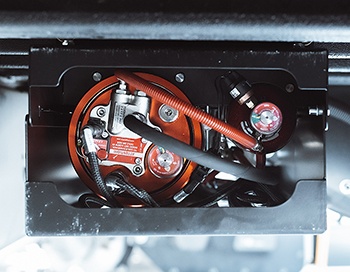
Mobile County Public School System (MCPSS), the largest and oldest school district in Alabama, took a major step forward for safety when it installed Fogmaker Fire Suppression Systems on its entire fleet of more than 700 buses.
 The move was spurred by an earlier thermal incident in which an MCPSS bus caught fire. The fire was minor, and all students evacuated the vehicle safely – but it made MCPSS Director of Transportation Pat Mitchell think hard about how to prevent similar events in the future.
The move was spurred by an earlier thermal incident in which an MCPSS bus caught fire. The fire was minor, and all students evacuated the vehicle safely – but it made MCPSS Director of Transportation Pat Mitchell think hard about how to prevent similar events in the future.
Prior to joining MCPSS in 2011, Mitchell spent more than 20 years in law enforcement. For this reason, he said safety has been a top priority in his mind for over three decades.
“We had been very fortunate in that no one was hurt,” Mitchell said. “But I kept thinking of ways that we needed to try to fix this. The thermal incident was on a regular education bus, but what if it had happened on a special needs bus where evacuation can take longer?”
“I wanted to implement a tool that would keep all of our students safe if this ever happened again,” he said. “These kinds of incidents are so scary – they make the hair stand up on your neck. We are entrusted to get our kids to and from home safely every day, and we take that very seriously.”
Mitchell and MCPSS were approached by Fogmaker in 2018, and the district was equally impressed by the technology as it was with United Safety, manufacturers of the Fogmaker system.
“Early on, we built a relationship with United Safety where we trusted their Fogmaker representatives,” he said.
After MCPSS’s fleet manager saw the system in action, he found that Fogmaker’s water-mist disbursement mechanism was the perfect fit for MCPSS. The transportation department presented it to the district’s superintendent, who supported the upgrade. After the district received consent from the Alabama State Department of Education-Pupil Transportation Division, the Fogmaker installation was approved.
“This is the largest district that I know of to make this decision of their own free will,” said Ken Hedgecock, national sales manager for United Safety with a focus on the school bus industry. “They’re one of the first to actually go above and beyond what the State requires and to outfit their entire fleet with this technology.”

How it Works
United Safety is the North American distributor of Fogmaker, which produces fire suppression systems with high-pressure water mist for engine compartments or other closed areas.
“First and foremost, we know that school buses are transporting our most precious assets – our children,” said Joseph Mirabile, President and CEO of United Safety. “So, we’ve developed and engineered the system to really be an extra layer of safety for these buses. As temperatures start to heat up, we’ve seen an uptick nationally in school bus fires. I think MCPSS is one of the groups pushing for the absolute safest means of transportation.”
The key feature of the Fogmaker system is that it is water based. That water-based system is unique because it attacks all three sides of the “fire triangle:” Heat, oxygen, and fuel.
The Fogmaker system deploys for 45 to 60 seconds, a longer deployment cycle which helps keep the fire down for a longer period.

“Our system provides a significantly longer suppression time as compared to other systems,” said Jeff Krueger, Vice President of Field Operations at United Safety. “Other competitive systems might deploy for 10 to 15 seconds, but we’ll deploy for upwards of a minute. Furthermore, our water mist provides a cooling element, which is somewhat unique in the industry. In this way, it really is attacking all three elements of the fire triangle.”
The system is 100-percent mechanical, so it does not rely on any electrical sensors for deployment. When the system senses that a thermal event is taking place, the system’s detection tube melts and the watermist suppressant begins to spray through the nozzles covering the engine and battery box. It relies on no electrical signals, which is critical if there is an electrical loss in the vehicle.

The Fogmaker System will deploy regardless of the vehicle’s configuration. Whether the bus is upside down, on its side, or standing correctly, the system will deploy fully without fail. This is because the system’s deployment relies on pressure as opposed to gravity.
“The system will always deploy,” Krueger said. “It’s fail-safe because it’s mechanical, so it works in the event of an electrical short or disruption to the vehicle’s battery cables.”
Although MCPSS does not have any electric vehicles, Krueger explained that the system is ready-made to fight and suppress lithium-ion battery fires – to maximize evacuation time and provide a window for emergency services to take over.
“Water mist is the most effective means to fight an electrical fire,” Krueger said. “That has been verified via studies and reports by the Federal Aviation Administration, and others. In the event of a thermal runaway fire, like those in lithium-ion batteries, you can’t extinguish the fire with a fire suppression system. You’re buying time for evacuation by cooling the fire, and water mist is the most effective solution.”
MCPSS: Fleet-Wide Fire Suppression
The MCPSS fleet consists of 100 special needs buses and 646 full-size school buses, with a mix of diesel and propane-powered vehicles. The special needs buses were equipped with Fogmaker first, followed shortly after by the full fleet. It represented the first and largest fleetwide installation of fire suppression equipment in Alabama.
MCPSS and Fogmaker developed an installation plan to coincide with the district’s transportation schedule. The two parties carefully executed an install that did not interfere with the district’s daily student transportation, working on buses during pre-planned downtime for each vehicle.
 “We have a universal installation kit, so the bus could be a 2013 model or a 2023 model,” Krueger said. “And when a bus retires, MCPSS has the ability to remove the system and put it on a new bus if they desire.”
“We have a universal installation kit, so the bus could be a 2013 model or a 2023 model,” Krueger said. “And when a bus retires, MCPSS has the ability to remove the system and put it on a new bus if they desire.”
MCPSS’s fleet manager worked with Fogmaker to familiarize the district’s maintenance team with the fire suppression system. The system itself requires an annual inspection, which works in conjunction with MCPSS’s preexisting monthly and annual fleetwide bus inspections.
Initial community reactions to the fire suppression system installation were extremely positive, with local media focusing on the size and scope of the installation. And now, Mitchell said, the community views MCPSS’s fire safety to be a standard expectation.
“Now that we’ve been buying new buses and outfitting them with the system, it’s the norm,” he said. “Every new bus will have the system installed.”
“We thankfully have not had any thermal incidents since installing Fogmaker, but I know I’ll sleep better knowing that our entire fleet is outfitted with the system,” Mitchell concluded.
Going Above and Beyond for Safety
“I think what MCPSS is doing is absolutely special,” Mirabile said. “I think the district is a market leader in safety, and Pat Mitchell and his team are trailblazing in trying to create the best, safest environment for school transport.”
Hedgecock commended MCPSS and Mobile County for their proactive stance on fire suppression and bus fire safety.
“Fire suppression offers another level of safety, peace of mind, and security,” he said. “The fact that a school district like MCPSS has made this decision without being forced into it really says a lot about Mobile County and Mr. Mitchell.”
“More than anything – the system’s dependability, reliability, and that the financial investment is minimal over the life of a vehicle – it’s the right thing to do,” Hedgecock added.


